The Rising Challenge of Misinformation in the 2024 Election Cycle
As we approach the 2024 election season, the issue of misinformation and deceptive news is becoming increasingly prominent in our political discourse. With social media and digital communication channels significantly influencing public perception, voters face a formidable task: differentiating between reality and falsehoods in an environment rife with manipulation. This article examines the scope of misinformation, its potential effects on electoral behavior, and the overall integrity of democratic processes. We will draw insights from experts, analyze recent patterns in misinformation dissemination, and provide strategies for news consumers to navigate this complex landscape effectively as they prepare for their votes.
The Changing Dynamics of Misinformation in Elections
The landscape of misinformation during election campaigns has evolved significantly due to advancements in digital technology. In a time when social media platforms are often primary sources for news consumption, voters find themselves overwhelmed by a torrent of information—some accurate while much is misleading. These platforms have become breeding grounds for false narratives that thrive on algorithms prioritizing engagement over factual accuracy. Consequently, misleading information can rapidly gain traction online before it undergoes any verification process. The implications are particularly severe during elections when public sentiment can shift dramatically based on inaccurate portrayals of candidates or their policies.
Given the sophisticated methods employed by those spreading disinformation, it is essential for voters to stay alert. Recognizing reliable information sources is vital; consider these important guidelines:
- Source evaluation: Always verify where your information originates from; reputable news organizations follow ethical journalism standards.
- Fact-checking resources: Use platforms like Snopes or FactCheck.org to differentiate between truth and deception.
- Caution with sensationalism: Be wary of headlines or memes designed to provoke strong emotional reactions.
The table below highlights common types of misinformation observed during recent electoral cycles:
| Misinformation Type | Description |
|---|---|
| Synthetic Media (Deepfakes) | A manipulated video that depicts candidates engaging in actions they never performed. |
| Bots & Automated Content | Scripting accounts that amplify false narratives creating an illusionary consensus among users. |
The Effect of Fake News on Electoral Decisions
The rampant spread of fake news during elections poses a serious threat to democratic integrity by shaping voter perceptions and potentially swaying election outcomes. Misinformation can be particularly influential among undecided voters who may alter their views based on distorted representations regarding key issues or candidates’ stances. The ramifications extend beyond individual beliefs; they foster a highly polarized electorate that gravitates towards emotionally charged narratives rather than factual ones—leading individuals away from informed decision-making processes influenced by verified data.
Tackling fake news requires enhancing critical media literacy skills among voters so they can identify trustworthy sources amidst today’s fast-paced digital environment effectively. Here are some essential strategies:
- Cross-verification: Check facts against multiple credible sources before accepting them as true.
- Misinformation awareness: Stay updated about prevalent tactics used in spreading disinformation such as clickbait headlines.
- Community engagement: b > Discussing media experiences with others helps broaden perspectives.
li > ul >Fake News Type th > Potential Consequences th >
< / tr >
< /thead >Misleading Articles td >< td >Shift voter opinions regarding candidates .< / td > tr >< tr >< td >Manipulated Data Statistics Distor t perceptions about policy effectiveness .< / td > tr >< tr >< td >False Endorsements Misdirect voter trust .< / td > tr > tbody > table > Navigating Disinformation Challenges as Voters
Voters today must adopt critical thinking skills when consuming political content due to how easily misinformation spreads online , especially around elections . To help separate fact from fiction , individuals should implement several effective techniques :
- < strong >Fact-check tools : strong > Leverage established fact-checking websites like Snopes or FactCheck.org prior sharing stories .< br />
< li >< strong >Evaluate source credibility : strong >> Assess whether the source providing information holds credibility ; prioritize well-known , respected outlets .
< li >< strong >>Cross-reference claims : strong >> Validate assertions through multiple independent reports ; if various outlets cover similar stories , accuracy likelihood increases .Moreover , community discussions offer valuable insights into discerning truthfulness within narratives surrounding politics . Voters should engage family members friends about current issues since these conversations reveal diverse viewpoints motivations behind differing claims .
Social media participants must also exercise caution actively reporting suspicious content contributing healthier informational ecosystems .
Key reminders include :
- < strong >>Stay updated : Regularly consume varied new sources cultivate comprehensive understanding events occurring around you .
< li >< strong >>Digital literacy education : Learn about filter bubbles echo chambers trapping individuals within misleading cycles .
< li << b>>Critical engagement : When encountering emotionally charged sensational material pause reflect before reacting sharing it further.
Conclusion: Safeguarding Democracy Through Informed Voting Practices
As we move deeper into this election cycle , concerns surrounding fake news continue escalating casting shadows over reliability available information impacting voter choices directly .
With rampant disinformation circulating across social networks other channels stakes have never been higher than now ! It’s imperative that citizens remain vigilant critically assess origins materials consumed seek out trustworthy journalistic entities informing decisions made at polls.
History illustrates profound consequences stemming from unchecked misrepresentation affecting not only personal voting behaviors but also undermining overall democratic principles integrity itself.
During this pivotal moment awareness discernment play crucial roles navigating complexities inherent upcoming elections ultimately empowering citizens safeguard democracy demanding transparency accountability both candidates journalists alike!
- < strong >>Stay updated : Regularly consume varied new sources cultivate comprehensive understanding events occurring around you .
- < strong >Fact-check tools : strong > Leverage established fact-checking websites like Snopes or FactCheck.org prior sharing stories .< br />









